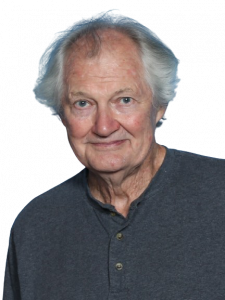
Andrew Robinson
Star Trek: Deep Space Nine
Andrew Robinson’s first professional roles were as a stage actor and playwright in New York. His first role in New York was in the play MacBird!. He went on to appear in productions in North America and Europe, including Woyzeck, Futz, Werner Liepolt’s “The Young Master Dante” and The Cannibals. In 1969, he had his first television role with a guest part on N.Y.P.D.at the age of 26. In 1971, he began acting in feature films.
Robinson’s first feature film role was in 1971’s Dirty Harry. Don Siegel, the film’s director, and Clint Eastwood picked Robinson for the role after seeing him in a production of Fyodor Dostoevsky’s The Idiot. Robinson was cast as the Scorpio Killer, the antagonist of the film. The Scorpio Killer was largely based on the contemporary real life Zodiac Killer, and Robinson integrated many known aspects of that serial killer’s personality into his acting, such as a disturbed sense of humour and a sadistic inclination to taunt his pursuers. In the film, his character murders a young woman, a 10-year old boy, a teenage girl and a police officer and takes a school bus full of young children hostage. His portrayal was so convincing that he received death threats after the film’s release. Director Don Siegel noted that he cast Robinson because he had the face of “a choir boy.”
Some of his notable “psycho” roles include a demented and ill-fated military barber in Child’s Play 3 (1991) and the character Frank Cotton (in the skin of Larry Cotton, Robinson’s actual character) in the horror film Hellraiser (1987), in which Robinson had his first lead role in a feature film.
Robinson starred in Charley Varrick, a 1973 film that starred Walter Matthau and was directed by Don Siegel. In 1975 he co-starred as the sleazy, ill-fated chauffeur in the detective drama The Drowning Pool, starring Paul Newman.
Robinson played Frank Ryan on the soap opera Ryan’s Hope from 1976–78, for which he received a Daytime Emmy nomination. Robinson has had many one-time and recurring roles on a wide variety of television shows. His filmography includes guest roles on Bonanza, Marcus Welby, M.D., Kung Fu, Ironside, The Rookies, S.W.A.T., The Streets of San Francisco, Kojak, The Incredible Hulk, CHiPs, Mrs. Columbo, Barnaby Jones, Vega$, Falcon Crest, The Greatest American Hero, The Dukes of Hazzard, Hart to Hart, The A-Team, Matt Houston, Moonlighting, L.A. Law, Matlock, Law & Order, Walker, Texas Ranger, Murder, She Wrote, The X-Files, The Practice, and Without a Trace.
In 1986, he played President John F. Kennedy in an episode of the 1980s revival of The Twilight Zone, “Profile in Silver”.In 1988 he portrayed Liberace in a television biopic. Robinson had described it as one of his favorite roles and that “The most fun was wearing his furs and jewelry and singing ‘I’ll be Seeing You.'” He returned to the stage in 1993 with a Broadway production of Frank Gilroy’s Any Given Day.
In 1993, Robinson was cast in his first regular television role since Ryan’s Hope in 1978. He played Elim Garak on Star Trek: Deep Space Nine, a Cardassian tailor, and a former operative of the Obsidian Order. The character was intended to be an enigmatic darkly comedic foil for the character of Julian Bashir (played by Alexander Siddig), and the two were often paired together onscreen.
Robinson was offered the role of Garak after he originally auditioned for the role of Odo, which eventually went to René Auberjonois.
After working on Deep Space Nine for several years, Robinson began a career in television directing after directing the 1996 episode “Looking for par’Mach in All the Wrong Places.” He went on to direct two episodes of Star Trek: Voyager and seven episodes of the courtroom drama Judging Amy, in which his real-life daughter, Rachel Robinson, was appearing.
In 2000, he wrote the novel A Stitch in Time, based on his character on Deep Space Nine. Robinson has stated that one of the reasons he wrote the novel was to get “total closure” of the character.
He starred opposite DS9 costar Michael Dorn on an episode of Martial Law.
